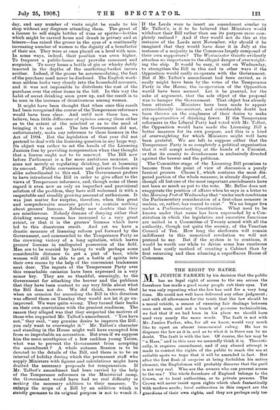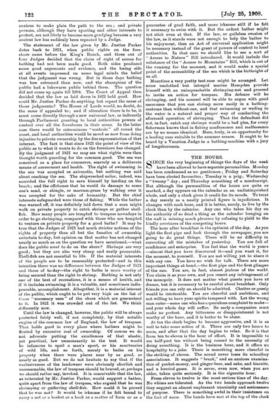THE RIGHT TO BATHE.
MR. JUSTICE PARKER by his decision that the public has no legal right of access to the sea across the foreshore has made a good many people rub their eyes. Yet he was only repeating what the law has said for a very long time. He could not well have delivered any other judgment ; and with all allowances for the truth that the law should be a moral vehicle, a means of ensuring fair dealings between man and man, and not a bunch of perverse technicalities, we feel that if we had been in his place we should have used very nearly the same words. The fault is not with Mr. Justice Parker, who, for all we know, would very much like to upset an almost immemorial ruling. He has to dispense the law as it is, and as to what it is there can be no doubt. The fault is with the law. Of course, the law may be "a Hass," and in this case we assuredly think it is. Theoreti- cally, it requires amendment, and if any absurd attempt is made to contest the rights of the public to reach the sea at suitable spots we hope that it will be amended in fact. But after the first flush of surprise at being forbidden his native element, the Englishman will probably discover that the peril is not very real. Who are the owners who can prevent access to the sea ? The whole foreshore of England belongs to the Crown, or to local authorities, or to private persons. The Crown will never insist upon rights which clash fantastically with modern needs; local authorities in this respect are the guardians of their own rights, and they are perhaps only too
anxious to make plain the path to the sea ; and private persons, although they have sporting and other interests to protect, are not likely to become more grudging because a very ancient law has suddenly been repeated by a Judge.
The statement of the law given by Mr. Justice Parker dates back to 1821, when public rights on the fore- shore came before the King's Bench, and three out of four Judges decided that the claim of right of access for bathing had not been made good. Both sides produced some good arguments and evidence, and the losing side at all events impressed on some legal minds the belief that the judgment was wrong. But in those days bathing was leas esteemed than now, and the champions of the public had a lukewarm public behind them. The question did not come up again till 1904. The Court of Appeal then decided that the law as laid down in 1821 held good. How could Mr. Justice Parker do anything but repeat the sense of those judgments ? The House of Lords would, no doubt, do the same if appealed to ; and if alteration there is to be, it must come directly through a new universal law, or indirectly through Parliament granting to local authorities powers of control over all the foreshores in their areas. In the latter case there would be coterminous "controls" all round the coast, and local authorities would be saved as now from doing injustice to private ownership by the due representation of that interest. The fact is that since 1821 the point of view of the public as to what it wants to do on the foreshore has changed. , By the judgment of 1821 we may see what rights were then thought worth guarding for the common good. The sea was conceived as a place for commerce, scarcely as a deliberate means of amusement and health. The right of swimming in the sea was accepted as axiomatic, but nothing was said about reaching the sea. The shipwrecked sailor, indeed, was accorded the full right to save himself by landing on the beach ; and the offcbance that he would do damage to some one's sand, or shingle, or marratn-grass by walking over it was accepted for the sake of humanity. But the chief interests safeguarded were those of fishing. While the bather was warned off, it was definitely laid down that a man might walk on private property to catch shrimps or gather shell- fish. How many people are tempted to trespass nowadays in order to go shrimping, compared with those who are tempted to venture on private property for a good bathe ? It may be true that the Judges of 1821 had much stricter notions of the rights of property than all but the fanatics of ownership entertain to-day, but opinion on that matter has not changed nearly so much as on the question we have mentioned,—what does the public want to do on the shore ? Shrimps are very good; but they are also very cheap and easily procurable. Shell-fish are not essential to life. If the material interests of the people are to be reasonably protected—and in this intention there was no difference between the Judges of 1821 and those of to-day--the right to bathe is more worthy of being secured than the right to shrimp. Bathing is not only one of the best of recreations, it is a means of health, and if it includes swimming it is a valuable, and sometimes indis- pensable, accomplishment. Altogether, it is a material interest of the public, which ought to be put very high on the list of those "necessary uses" of the shore which are guaranteed to it. In 1821 it was crowded out of the list. We think differently now.
Until the law is changed, however, the public will be always protected fairly well, if not completely, by that notable engine of the common law of England, the law of trespass. That holds good in every place where bathers might be Routed by excessive zeal (.4 ownership. Of course we do not advocate putting the excellences of that elastic, yet practical, law unnecessarily to the test. It would be infamous to spoil a man's sport, or his sanctuaries of wild life, and so forth, merely to bathe on his property when there were places near by as good, or nearly as good. But we do not hesitate to say that if the exclusiveness of the landowner were obviously churlish and unreasonable, the law of trespass should be braved, or, perhaps we should rather say, invoked. It is conceivable that the law, as reiterated by Mr. Justice Parker, would support a bather, quite apart from the law of trespass, who argued that he was shrimping or gathering shell-fish. How could it be proved that he was teat? It would be irksome if he felt bound to carry a net or a basket or a hook as a matter of form or as a guarantee of good faith, and more irksome still if he felt it necessary to swim with it. But the ardent bather might not stick even at that. If the law, or guileless evasion of the law, as it stands were not enough to help the bather to his enjoyment, then an Act of universal application might be necessary instead of the grant of powers of control to local authorities. In that case we should like to see a sort of "Access to Nature" Bill introduced. It would include the substance of the "Access to Mountains" Bill, which is out a the running for the moment, and it would make a special point of the accessibility of the sea which is the birthright of us all.
Meantime a very pretty test case might be arranged. Let some unclothed but intrepid marine Hampden provide himself with an unimpeachable shrimping-net and proceed to invite an action for trespass. His defence will be shrimping, and his counsel will be able to argue with good assurance that you can shrimp more easily in a bathing- costume than without one, and that swimming or wading in the water is a natural and proper way of conducting the aforesaid operation of shrimping. That the defendant did not, in fact, catch any shrimps would be a had plea, for every fisherman knows that in fishing nonfeasance and malfeasance are by no means identical. Here, truly, is an opportunity for a leading case suitable to the summer season. It ought to be heard by a Vacation Judge in a bathing-machine with a jury of longshoremen.







































 Previous page
Previous page